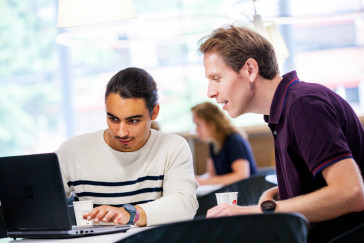Most aesthetic sports where judges subjectively rate performances can suffer from issues like systematic errors due to biases. Equestrian dressage is defined through the intricate interaction between horse and rider. Assessing these interactions can be particularly complex, often exceeding human processing capabilities. The study focuses on whether the current dressage system predisposes international judges to using biases, and inadvertently favours certain horse-rider combinations. The study examined 510 judging scores, gathered from seven elite-level dressage competitions held between May 2022 and April 2023. The effect of different factors, such as whether riders competed in their home country, if they had the same nationality as the judges, their starting order during the competition, and how they were ranked according to previous performances were analysed. Results showed that all these factors influence the final dressage results. In order to assist judges in providing objective, transparent scores, a clear evidence-based set of judging guidelines should be developed, which would prevent judges from having to resort to cognitive short cuts. That way, the complexity of judging is reduced, making scores more objective, transparent and fair.
LINK
This chapter addresses two central questions concerning judges and gender: what is the situation of women judges in the Netherlands, and do women judge differently from men?
DOCUMENT
All experience/knowledge comes from three sources: (1) perception, (2) the past (consolidated perception in memory, or mediated by "technology": stories, writing, photo, etc.), or (3) judgment/argument based on perception and past (analogy). There is something special going on with our 'judgments '. Our judgements are not only fooled on the basis of perceptual traces created in our brain, as shown in perceptual illusions when we see or hear things that are not actually shown, it also seems that our two hemispheres judge differently. Optimization through analysis and numerical insight may not be the best strategy, certainly not when judging in the context of forecasting. And that while all our knowledge can again be traced back to three sources, perception, past (consolidated perception) and judgment.
MULTIFILE

Studenten in het beroepsonderwijs leren op de werkplek om een goede beroepsuitoefenaar te worden. Beoordeling van het werkplekleren gebeurt vaak op de werkplek en door de werkplek. Dit promotieonderzoek wil in kaart brengen hoe werkplekopleiders de student beoordelen.

Society continues to place an exaggerated emphasis on women's skins, judging the value of lives lived within, by the colour and condition of these surfaces. This artistic research will explore how the skin of a painting might unpack this site of judgement, highlight its objectification, and offer women alternative visualizations of their own sense of embodiment. This speculative renovation of traditional concepts of portrayal will explore how painting, as an aesthetic body whose material skin is both its surface and its inner content (its representations) can help us imagine our portrayal in a different way, focusing, not on what we look like to others, but on how we sense, touch, and experience. How might we visualise skin from its ghostly inner side? This feminist enquiry will unfold alongside archival research on The Ten Largest (1906-07), a painting series by Swedish Modernist Hilma af Klint. Initial findings suggest the artist was mapping traditional clothing designs into a spectral, painterly idea of a body in time. Fundamental methods research, and access to newly available Af Klint archives, will expand upon these roots in maps and women’s craft practices and explore them as political acts, linked to Swedish Life Reform, and knowingly sidestepping a non-inclusive art history. Blending archival study with a contemporary practice informed by eco-feminism is an approach to artistic research that re-vivifies an historical paradigm that seems remote today, but which may offer a new understanding of the past that allows us to also re-think our present. This mutuality, and Af Klint’s rhizomatic approach to image-making, will therefore also inform the pedagogical development of a Methods Research programme, as part of this post-doc. This will extend across MA and PhD study, and be further enriched by pedagogy research at Cal-Arts, Los Angeles, and Konstfack, Stockholm.
Werknemers en werkgevers in de Groen Grond Infra (GGI) sector krijgen een steeds grotere rol in de natuurinclusieve transitie binnen de agrarische sector en GGI. Deze groene transitie vereist verschillende soorten kennis, investeringen en inzet van loonwerkers. De betrokken loonwerkers moeten nu niet alleen taken uitvoeren maar ook meedenken over hoe die taken uit te voeren om bij te dragen aan de groene transitie. Een belangrijk onderdeel van deze verandering is dat werknemers als "change agents" gaan optreden. Dit betekent dat ze, dankzij hun kennis en houding, helpen om de groene transitie te realiseren. De GGI-sector omvat veel verschillende werkterreinen, zoals cultuurtechniek, agrarisch loonwerk en beheer van groene ruimtes. Om studenten op te leiden voor de arbeidsmarkt in deze diverse sector, is een nieuwe aanpak nodig. Deze aanpak moet de diversiteit van de sector bedienen en studenten stimuleren om een ondernemende en duurzame rol aan te nemen. Bedrijven, studenten, docenten, onderzoekers en andere betrokkenen gaan in een praktijkonderzoek een leeromgeving creëren die opleidt voor deze "change agents". In dit pilot-onderzoek werken studenten, bedrijven, een docent-onderzoeker, een practor en lector samen met vraaggestuurd onderwijs. Dit betekent dat de leerbehoeften van de studenten centraal staan, binnen kaders van duurzaamheid en natuurinclusiviteit. Het bedrijfsleven en het onderwijs faciliteren het leerproces, bewaken de kaders en reflecteren met de studenten op hun toekomstige rol als "change agents" in de GGI-sector. Het doel van dit pilot-onderzoek is dat studenten GGI(loonwerk) vaardigheden en tools ontwikkelen om mee te denken binnen de groene transitie. Door middel van interviews, Situational Judgement Tests en rubrics wordt inzicht verkregen in dit proces. De onderzoeksvraag is: Hoe kan vraaggestuurd onderwijs, vormgegeven door studenten, bedrijfsleven en Terra MBO, bijdragen aan een ondernemende houding bij GGI-studenten, zodat zij beter kunnen functioneren als "change agents" in toekomstbestendig loonwerk?